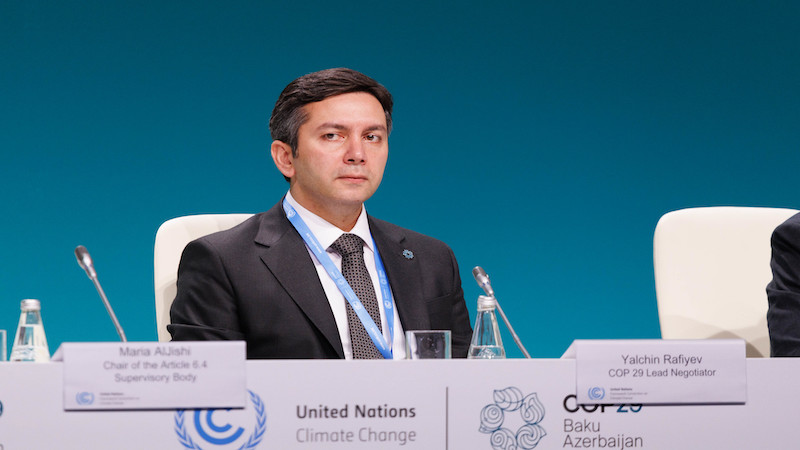The Azerbaijan COP29 presidency scrapped the launch of a new climate fund with expected contributions from fossil fuel producers during the summit as the initiative risked interfering with negotiations over the post-2025 climate finance goal.
The COP29 hosts had planned to unveil the Climate Finance Action Fund (CFAF) – one of their most controversial flagship initiatives – at a “high level” event to coincide with the conference’s finance day on Thursday.
But the presidency quietly dropped the event while putting the initiative on hold until the end of COP29.
A source near the COP presidency told Climate Home News that the fund was deprioritised due to risks that it would interfere with negotiations on the new climate finance goal – the main outcome of the summit.
When Climate Home asked Azerbaijan’s lead negotiator Yalchin Rafiyev about it, he said that the COP hosts have established a working group to “work out a concept that would be workable and acceptable” for donor countries interested in joining the initiative.
He added that it is “a very complex process to establish a new fund” but that they have seen “a great interest” by the potential contributors from developing and developed countries.
‘Getting tangled up’ with NCQG
A COP29 source who did not want to be named told Climate Home that the presidency decided to deprioritise the initiative temporarily as it was getting tangled up with the negotiations over the new collective quantified goal (NCQG).
Governments are locked in tense discussions over a host of issues, including the size of the goal and who should be contributing towards it.
The source said that potential donors from developing countries were particularly worried that pitching money into Azerbaijan’s fund now would be seen as a precedent that could be used to push them to contribute to the NCQG as well. On top of this, developed countries might have counted any contributions into the CFAF towards their climate finance share, the COP29 source added.
The CFAF seeks to raise at least $1 billion and should become operational when at least 10 countries commit money to the vehicle, according to the COP29 presidency. It is meant to channel funding “primarily” towards developing countries to help them shift to clean energy, improve energy efficiency and boost climate resilience.
The initiative would mainly give out money at commercial lending rates with only a fifth of its revenues being reinvested into a facility providing “highly concessional and grant-based support” to vulnerable countries.
COP president Mukhtar Babayev called the fund “a significant step” in July when the idea was first floated. “We’ve heard that communities want action not words,” he said then.
‘Greenwashing fund’
Climate campaigners have reacted positively to the postponement of the fund. They have previously criticised it as a distraction from efforts to make fossil fuel producers pay adequate reparations for the climate crisis they are primarily responsible for.
While the COP29 presidency insists that the fund will go ahead soon, Andreas Sieber, associate director of policy and campaigns at 350.org, said it would be no loss for the planet if it ended up being scrapped entirely.
“The presidency’s fossil fuel fund was a distraction and a greenwashing fund,” he told Climate Home. “Putting money into a fund while expanding fossil fuels essentially means pretending to put out a fire while feeding it more fuel”.
At COP29, Azerbaijan had also been expected to announce a new national climate plan – known as a nationally determined contribution (NDC) – but it has yet to do so.
